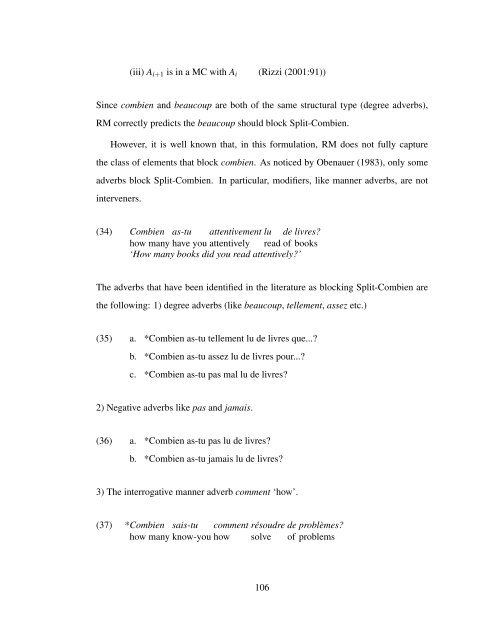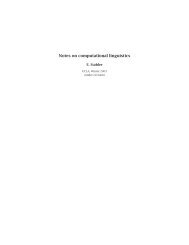Formal Approaches to Semantic Microvariation: Adverbial ...
Formal Approaches to Semantic Microvariation: Adverbial ...
Formal Approaches to Semantic Microvariation: Adverbial ...
Create successful ePaper yourself
Turn your PDF publications into a flip-book with our unique Google optimized e-Paper software.
(iii) A i+1 is in a MC with A i (Rizzi (2001:91))<br />
Since combien and beaucoup are both of the same structural type (degree adverbs),<br />
RM correctly predicts the beaucoup should block Split-Combien.<br />
However, it is well known that, in this formulation, RM does not fully capture<br />
the class of elements that block combien. As noticed by Obenauer (1983), only some<br />
adverbs block Split-Combien. In particular, modifiers, like manner adverbs, are not<br />
interveners.<br />
(34) Combien as-tu attentivement lu de livres?<br />
how many have you attentively read of books<br />
‘How many books did you read attentively?’<br />
The adverbs that have been identified in the literature as blocking Split-Combien are<br />
the following: 1) degree adverbs (like beaucoup, tellement, assez etc.)<br />
(35) a. *Combien as-tu tellement lu de livres que...?<br />
b. *Combien as-tu assez lu de livres pour...?<br />
c. *Combien as-tu pas mal lu de livres?<br />
2) Negative adverbs like pas and jamais.<br />
(36) a. *Combien as-tu pas lu de livres?<br />
b. *Combien as-tu jamais lu de livres?<br />
3) The interrogative manner adverb comment ‘how’.<br />
(37) *Combien sais-tu comment résoudre de problèmes?<br />
how many know-you how solve of problems<br />
106
















